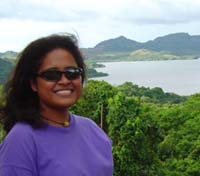







| PROGRAMMES | PROE | PUBLICATIONS, LIBRARY and IRC | SITE MAP | SPREP FORUMS | WEBMAIL - Global / Local | CONTACT | HOME
| Search |
Press Release: International Waters Project
IWP Scholarship Scheme Increases Environmental Capacity in Palau
7/21/2004

The International Waters Scholarship Scheme is helping Kimie Ngirchechol find ways to reduce the impacts of increasing development on the coastal environment of Palau. With assistance from the Scheme, Kimie has now begun work on her Masters in “Water Quality and Microbial Pollution” at the University of Guam’s Environmental Science Programme.
Kimie says that watershed management has now emerged as a real priority for Palau. “In recent years we have experienced increased nutrient leaching from dumpsites, farming, golf course development, and urbanization. I believe that by studying these impacts we can develop effective mitigation measures to help to conserve our natural resources.”
Prior to her studies Kimie worked in Palau as a water quality technician with the Environmental Quality Protection Board, and more recently as terrestrial and marine conservation management officer.
The U.S$273,000 International Waters Scholarship Scheme was established in 2003 to help build expertise in conservation and resource management in the Pacific region. Funded by the Global Environment Facility, the Scheme offers scholarships for 14 postgraduate students, valued at about US$20,000 each.
These scholarships are linked to the community–based pilot projects the International Waters Project (IWP) is managing in partnership with 14 Pacific Island countries. The objective of these pilot projects is to improve the sustainable management of coastal resources by focusing on “root causes” and possible solutions at the community and national level. These projects are focusing on the different focal areas of coastal fisheries, waste reduction, or the protection of freshwater resources.
In June 2002 the Palau IWP selected “Community-Based Waste Reduction” as the focal area for its pilot project. Known as one of the diving wonders of the world Palau’s teeming marine life attracts divers and tourists from around the globe. Joe Aitaro, the National Coordinator for Palau’s International Waters Project, says there is increasing concern that the poor management of waste could have a negative impact on the country’s environment, tourist industry, and public health.
“In Palau each of the 16 states manages their own dumpsites and the management of these dumps is generally pretty poor. Waste lies uncovered in sensitive coastal areas such as mangroves and contamination of surface water likely to be occurring at most sites,” he says.
Joe says there is currently no real monitoring of the impacts of waste on Palau’s globally recognised marine environment. “Palau desperately needs local capacity to deal with such issues because the information acquired from this research can be used to enhance community management activities and national policy-making decisions,” he says.
Kimie says the current capacity for such work in Palau is limited by minimal testing capabilities. “I hope that developing greater skills in water quality analysis I will really be able to help enhance environmental conservation management practices in the Republic. It’s my hope that by the end of my studies I will have learned more about water quality to provide some of the much-needed technical know-how that is lacking in Palau.
The Palau IWP is focusing its activities in the rural village of Chollei in Ngarchelong, at the northern end of Palau’s largest island, Babeldaob. Work has now begun to collect more detailed baseline information on the ecological, social and economic impacts of poor waste management on the local community. It is hoped that this information will provide greater guidance for the development of community-based and national solutions to Palau’s growing waste problem.
Contact Name |
Steve Menzies |
e-mail |
sprep@sprep.org.ws |
Phone |
(685) 21929 |
Fax |
(685) 20231 |
.
